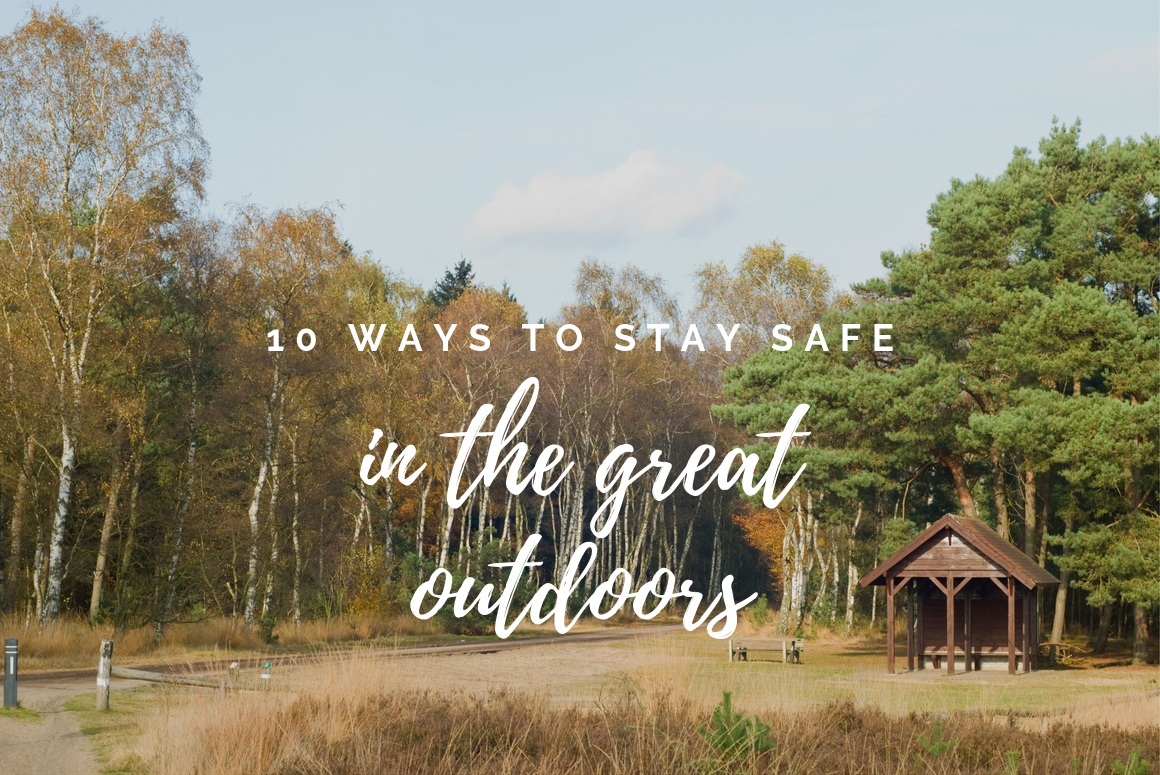It doesn’t matter what time of year it is, there’s plenty of occasions to get outside to enjoy the great outdoors. Whether you’re enjoying some time on the playground, taking a road trip, or going on vacation, here are 10 ways to be safe in the great outdoors.
On The Playground
There’s nothing more enjoyable for young kids than hopping on the swings or zipping down the slide. We don’t want to stop them from having fun but we want to make sure they’re as safe as possible while they’re there:
- Discuss the safety rules: Chat with your kids about the right way to behave around equipment and other kids – always wait your turn, use the equipment the way it’s intended to be used (always feet first down the slide!), and don’t run in front of swings while they’re in use.
- Wear the right clothing: Don’t let your little ones wear loose clothing or items with hoods or large pockets, and if they’ve ridden a bike or scooter to the playground, kids should remove helmets before playing as straps can get caught or stuck in equipment.
For more tips, read our other article: Supervise Playground Activities.
Camping
Most of us save our camping plans for the summer months but for those with motorhomes or RVs, the option is there year-round. However, and whenever, you prefer to camp keep these safety tips top of mind:
- Make sure your motorhome is trip-worthy: Before you get going in your RV, give it a thorough inspection, clean, and refresh to ensure that items like electrics, tires, and loose items are secured. Know how to accommodate for a larger vehicle on the road and parking, and always plan your trip well before you leave.
- Be campfire safe: This is such a key part of your camping experience that you don’t want to let an accident or irresponsible get in the way of those campfire stories and toasted marshmallows. Build your fire sensibly and properly, teach everyone to keep their distance once it’s lit, and always extinguish a fire completely before going to bed or leaving the campsite.
Driving
We spend a lot of time in our cars, from commuting to running errands to visiting family for special occasions, so it’s important to make sure you have all that you need while you’re in or around your vehicle:
- Prepare for emergencies: You could stall, experience a flat tire, get in an accident, or even get caught in a snowstorm mid-commute so having an emergency kit specific to your car and your personal needs is key. Consider adding some unique items like cat litter (to help in the snow), flares, and even a reflective vest to use if you have to get out of the car in the dark or inclement weather.
- Care for your car: No matter the season, taking care of your car is the best way to ensure it keeps you safe in return. Keep your vehicle regularly maintained with oil changes and fluid top-ups, and don’t let your tires go unnoticed – if you have the option to change your tires for summer and winter do so; it makes each set last that much longer when you’re not using them all year round.
Vacations & Travel
If you plan to be away from your home for any length of time, you and your home need to be safe:
- Protect your home: Unfortunately, when people know you’re away, your house can become a target for burglars, so it’s important to make your home look as occupied as possible while you’re on vacation – use timers for lights, have a neighbour pick up your mail, and consider parking a car in the driveway too.
- Prepare for wherever you’re going: There are a few things you can do before you travel to ensure your family is safe while on vacation – get insurance and make sure everyone has any necessary shots (this will depend on where you’re going), and pack a vacation emergency kit so you know you have everything you might need.
Severe Weather
From blizzards to wildfires, there are so many weather events that impact us from a safety perspective throughout the entire year. So that you can prepare for these, take a moment to determine what types of weather events might impact your area, and then plan around them:
- Prepare senior family members: Create a specific emergency plan and supplies for elderly family members, whether they live with you or not. Consider any mobility challenges and what to do in an evacuation should your family members have to leave their homes. Cold weather in the winter months can be dangerous at any point, so make sure you have a plan to check on everyone regularly.
- Be prepared on the go: Severe weather can happen when you’re at home or work, so be prepared to deal with any emergency on the go. Have emergency kits wherever you spend the most time, put together a communications plan, and choose family meetings points so that you can find one another even if you don’t communicate first.
The great outdoors can be a wonderful place to spend time, even if you’re just passing through – don’t let safety be a concern or a worry by preparing ahead of time!
Terms and Conditions
All content provided on this blog is for informational purposes only. The owner of this blog makes no representations as to the accuracy or completeness of any information on this site or found by following any link on this site. The owner will not be liable for any errors or omissions in this information nor for the availability of this information. The owner will not be liable for any losses, injuries, or damages from the display or use of this information. This policy is subject to change at any time.

